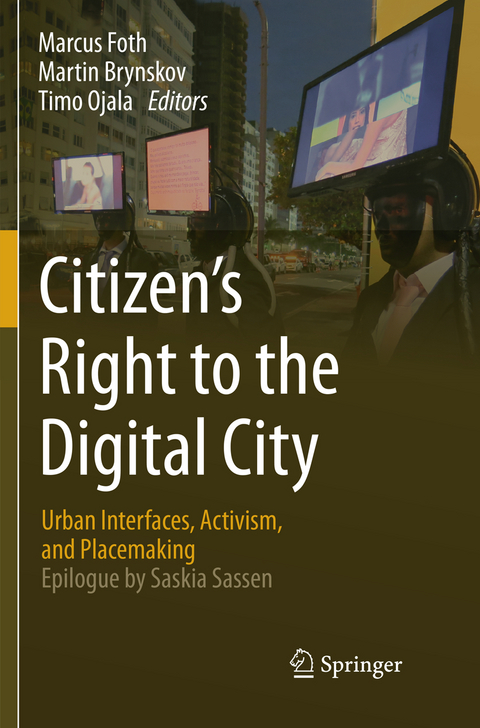
Citizen’s Right to the Digital City
Springer Verlag, Singapore
978-981-13-5727-5 (ISBN)
Professor Marcus Foth is founder and director of the Urban Informatics Research Lab, and Professor of Interactive & Visual Design in the School of Design, Creative Industries Faculty at Queensland University of Technology. Marcus’ research focuses on the relationships between people, place and technology. He leads a cross-‐disciplinary team that develops practical approaches to complex urban problems. He adopts human-‐computer interaction and design methodologies to build engagement around emerging issues facing our cities. Marcus has authored and co-‐authored over 120 publications in journals, edited books, and conference proceedings. Martin Brynskov, PhD, is associate professor in interaction technologies at the Department of Aesthetics and Communication at Aarhus University in Denmark. He is also research fellow at Participatory IT Centre (PIT) and Center for Advanced Visualization and Interaction (CAVI), director of the Digital Design Lab, co-founder of Smart Aarhus, and former director of the Civic Communication group at the Center for Digital Urban Living. He is the general chair of the Media Architecture Biennale 2012 and 2014. Working closely together with municipalities, artists, journalists, media organizations, and industrial partners, he investigates the consequences of digitization and explores new forms of mediation within a variety of domains with special focus on the role of social interaction, materials and interfaces. The research is mostly carried out as interventions and experiments in the wild, deploying prototypes and semi-‐permanent interactive systems. Timo Ojala is professor of computer engineering at the Department of Electrical and Information Engineering of the University of Oulu and the director of the MediaTeam Oulu research group. He received his M.Sc. (with honors) and Dr.Tech. degrees in 1992 and 1997, respectively, from the University of Oulu, Finland. He is the responsible director of the UrBan Interactions(UBI) program, which aims at building a functional prototype of future ubiquitous city in Oulu. He has authored about 100 international scientific publications on mobile multimedia, human computer interaction, networking and computer vision. He has served as the founding co-chair of the 1st International Conference on Mobile and Ubiquitous Multimedia (MUM 2002), the general chair of MUM 2007 conference and in the program committees of many international conferences and workshops. Marcus Foth, PhD, is Professor of Urban Informatics in the QUT Design Lab, Creative Industries Faculty at Queensland University of Technology. He is also an Honorary Professor in the School of Communication and Culture at Aarhus University, Denmark. Professor Foth’s research brings together people, place, and technology. His transdisciplinary work is at the international forefront of human-computer interaction research and development with a focus on smart cities, community engagement, media architecture, internet studies, ubiquitous computing, and sustainability. He has authored and co-authored over 180 publications in journals, edited books, and conference proceedings.
Socio-Cultural Role of Digital Screens in Urban Life.- Exploring Socio-Spatial Effects of Media Architectural Interfaces as Encounter Stages for Livable Cities.- An Eco-logic of Urban Interactive Environments.- Digital Participatory Budget: Local Democratic Practices in the Digital Era.
| Erscheinungsdatum | 04.03.2022 |
|---|---|
| Zusatzinfo | 16 Illustrations, color; 44 Illustrations, black and white; XXVII, 259 p. 60 illus., 16 illus. in color. |
| Verlagsort | Singapore |
| Sprache | englisch |
| Maße | 155 x 235 mm |
| Themenwelt | Informatik ► Software Entwicklung ► User Interfaces (HCI) |
| Naturwissenschaften ► Geowissenschaften ► Geografie / Kartografie | |
| Sozialwissenschaften ► Soziologie | |
| Technik | |
| ISBN-10 | 981-13-5727-7 / 9811357277 |
| ISBN-13 | 978-981-13-5727-5 / 9789811357275 |
| Zustand | Neuware |
| Haben Sie eine Frage zum Produkt? |
aus dem Bereich


